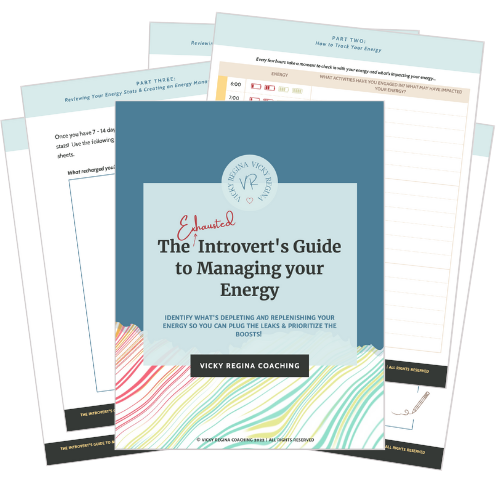Introvert Energy Management 101
For my first "real" job out of college, I was a consultant for a software company. I traveled half the month (not as glamorous as it sounds), visiting clients, giving presentations or training, and going to dinner with my colleagues and clients.
I was in the office fielding support calls for the rest of the month. That meant taking call after call from 8:30 am to 5:30 pm. Portions of each day were non-stop calls: as soon as I'd hang up from one, the next call was already ringing.
My coworkers were right out of college and new to our town, just like me. So, everyone bonded! My coworkers were my roommates and my entire social circle.
Between living with roommates and someone always having a party, I rarely had alone time.
Every Friday night, we'd leave work together, meet at a restaurant for dinner, then go to a bar or club.
It was fun, but it was also exhausting.
At the time, I didn't know I was extra exhausted because I was denying a fundamental need: managing my energy to ensure I had time to recharge.
It wasn't on my radar because I didn't know I needed it! Okay, yes, I knew I preferred having some time to myself, and I definitely felt more energized afterward, but it happened so infrequently that I didn't realize how important it was to my well-being.
I was SO used to pushing through, dealing with it, and slapping a smile on my I'm-ready-to-go-home face as the night wore on.
Looking back, I don't know how I managed it other than youthful energy and ignorance. I simply did what I knew to do, and that was to be like everyone else: be social (in my quiet way), enjoy parties (sometimes I did), have fun at bars or clubs (rarely happened), and don't be a loner by spending an entire weekend alone!
As we got older, people partnered off, got married, or moved away. Finally, the social pressure lessened, and I could finally enjoy a little space to breathe.
It wasn't until I was well into my 30s (after spending 4-1/2 years dating an extrovert with friends who loved to socialize and hang out all the time!) that I learned how valuable me-time is to my well-being.
And that's when I started prioritizing it and setting boundaries around it to protect my energy.
How often do you feel like you’re running on empty?
In order to prioritize what's needed to protect your energy, you first have to embrace the difference in the inner workings of introverts, and there's nothing wrong with that!
While extroverts gain more energy by being around others, introverts lose their energy by being around others. That's not a bad thing! It's just a different way of functioning.
When you understand the distinction between introverts and extroverts, you can release any self-judgment about your desire to spend more time on your own. It's natural and healthy for you.
To help you make this an active part of your self-care, here are 4 tips to get you started...
TIP #1: LEARN YOUR ENERGY PATTERNS
Everyone is unique. What drains me the quickest may only slightly drain you (and vice versa).If you're unfamiliar with how your energy flows, the first step is to get curious (an introvert asset!) and learn your own flow of energy.
What consistently drains you? What always recharges you? Do certain times of the day impact your energy more so than others? The more familiar you are with how your body responds to external stimuli, the easier it'll be to put parameters in place to protect and honor it.
I like to use a 1-5 scale and check in with myself throughout the day. Anything in the 1-2 area is the red zone: try to avoid landing here too often! To help you track your energy to better understand and protect it, download my free Introvert’s Guide to Energy Management workbook and tracker!
TIP #2: PLUG THE LEAKS
As you get familiar with your energetic ebbs and flows, notice what consistently drains you. These are the leaks you need to plug.You may be surprised at what steals your energy throughout the day! So, be open to what you find without judgment and see it as an opportunity to seal those cracks to you can function in a more optimal state.
TIP #3: PRIORITIZE THE BOOSTS
Spending time on your own will be a significant factor in bringing your energy levels back to a sustainable level. And you may also find that different activities recharge you in different ways.Find what works best for you, so you know what to do when your energy levels dip too low. Then, prioritize those activities that consistently refill your cup and make that part of your weekly routine.
The more you engage in these activities, the better you'll be able to avoid landing in the red zone!
Another tactic to keep your energy at sustainable levels is to intentionally plan white space into your schedule where possible. For example, when I worked a corporate 9-5 job, I had so many meetings that I was too tired to figure out what to have for dinner each night! I eventually had to talk with my team about the over-scheduling of meetings. I also intentionally blocked off time in my calendar so others couldn't fill it with back-to-back calls and meetings.
TIP #4: COMMUNICATE YOUR NEEDS
Once you recognize your energetic patterns, plug the leaks, and prioritize the boosts, you'll likely need to communicate these changes to others (i.e., set some boundaries!).This may start with saying 'no' to others when invited to socialize, but your energy needs some attention. This will likely feel uncomfortable if you've always just sucked it up and accepted those invitations. So, this may take some practice. But the more you communicate your needs, the more you tell yourself that your health is worth prioritizing.
This will help you boost your confidence, and I promise, it'll get easier and easier.
To communicate your needs to those in your life, you may need to start by explaining that you're an introvert, and this is part of your well-being. You can work with others to find the space you need, but they don't get to decide how much time you need to take care of your health.
If I end up with a hectic week and overdo it, I tell my boyfriend that I need a weekend to recharge, and we'll either skip hanging out or just have a quiet dinner. Thankfully, he's incredibly supportive of my tending to my energetic needs!
If you aren't sure where to start with understanding your energy, then download my free tracker so you can observe and learn how your energy flows! I'll also share tips about what to do with the information you collect!


